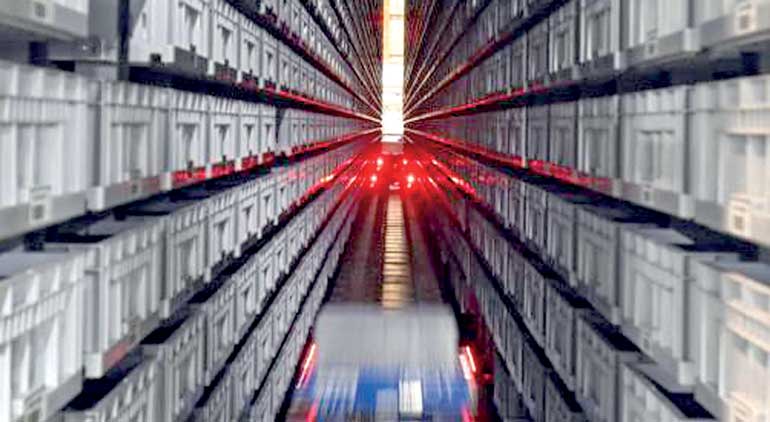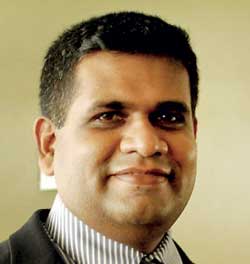Wednesday Feb 18, 2026
Wednesday Feb 18, 2026
Thursday, 14 September 2017 00:00 - - {{hitsCtrl.values.hits}}

Almost all processes in this day and age can be automated, however businesses should be cautious when automating certain processes and should first have a comprehensive understanding of which processes in fact need automating. Here, automated robots fetch merchandise from aisles at the Hudson’s Bay Company distribution centre in Toronto, Ontario, Canada – Reuters
Automation has been playing an increasingly important role in improving efficiency and reducing costs in many industries and sectors. It has also been sought after for addressing the challenges of skills shortage in certain industries while also threatening job security in others.
In order find out the impact of automation and its effects on the job market, Shenali De Silva of the Ceylon Chamber’s Economic Intelligence Unit interviewed Dr. Sankalpa Gamwarige, Vice President of Engineering of Zone24x7, who is a member of the Ceylon Chamber of Commerce’s National Agenda Committee on Innovation.
Here are four takeaways from our conversation with Sankalpa, on how automation will affect businesses as well as individuals:

1. Don’t blindly follow the automation trend
Almost all processes in this day and age can be automated observes Sankalpa, however businesses should be cautious when automating certain processes and should first have a comprehensive understanding of which processes in fact need automating.
Zone24x7’s clientele comprises of some of the leading retailers in the European region which have begun automating having reached a certain scale and processes has been established. For a country like Sri Lanka, understanding this dynamic is paramount in order to maintain better relationships with customers.
“I think we shouldn’t blindly follow trends, we need to understand at what point we can adopt them. Automation is a trending topic in the world and it has happened in different parts of the world and in different stages. The starting point to being efficient would be for people to get their fundamentals right. Because even before you automate you need to understand the value addition cycle.”
2. Machines will soon understand how you feel
Automation in the retail sector has been a keen focus for Zone24x7 and some of its core projects have been focused on this sector alone. However, the technology utilised and the processes automated can be applicable to many sectors.
While it is predominantly the mundane and repetitive tasks which are have more often been automated, intuitive human skills are also in the process of being automated, understanding how to add value to a business process once it has been automated will be key to achieving job security.
Currently operations which were previously performed solely by human beings in the retail sector are being automated, observes Sankalpa.
Zone 24×7 alone has introduced technology which automates mundane tasks through “inventory accuracy” – where a robot would be in operation during non-business hours to maintain inventory; the “enterprise locator system” – a systems that also helps locate and maintain inventory in an accurate manner after customers have requested for multiple sizes of apparel, and “synchronised floor platforms” – which is essentially a sensor that assists with people counting in order to indicate when dressing rooms are retail outlets need to be cleaned.
The large amount of data captured during these processes have enabled businesses make better strategic decisions and have also assisted with planning.
“The experience they get from mobile, or the tablet or your computers is different from the in-store experience, we want to make it unified and done through decision support engines, that would be big data coupled with data science algorithms then that information gives you information about discounts, information on items which customers prefer as well as recommendations.”
Some of the more challenging processed to automate have been related to identifying human emotion. However, these processes are currently in the process of being tested to enable in designing and strategy processes.
“Along with this, we also have an artificial intelligence based curator application which identifies what items are trending in fashion on social media. In the past the lack of data was a problem, now huge amounts of data is a problem so you have to introduce machine intelligence People don’t talk about moods and feelings they publish it online. There are algorithms now that can help with mood tracking, sentiment tracking. And these algorithms are available as services”
3. Not all processes can be automated
Sankalpa also observes that while most processes are likely to be automated in the future, jobs that require analytical skills are unlikely to be made obsolete. Furthermore, while mundane and monotonous skills are to be automated, this trend will propel employees to take on analytical roles and develop mathematical skills. Jobs such as engineering will be in demand and engineers are likely to be paid better than those employed for coding.
“Conventional coding programming jobs are going to be obsolete. They are going to pay more than what they are paying previously for software engineers. Designing and thinking skills will be demand. Plus tools such as auto-code generation are coming into use, this is another disruption. For the future, make them think through before coding. Coding can be automated, but that process of thinking through can’t.”
For Sri Lankans, our inherent empathetic qualities have been favourable for securing employment. Ensuring that we continue to project this message would likely lead to the success of better job opportunities.
“Sri Lankan people are liked better. While we might not have the best analytics teams, we are liked better as employees because of our empathetic skills. When collaborating on designs, Sri Lankans are known to be open to suggestions and discussions yet aggressive as a team.”
So, he argued that not all processes will get automated – analytical skills and empathy will still be key skills for the future.
4. Three sectors that
would benefit from automation efficiencies
According to Sankalpa, the public, financial services, and telecommunication sectors in Sri Lanka are poised to benefit from the efficiencies automation has to offer.
The public sector is a key sector that requires automation, states Sankalpa. While he has minimal experience catering to this sector, he has identified a few projects that are likely to improve quality of life, improve efficiency and reduce costs for the government. Some of these include; providing citizens with a digital identity, tracking wastage in government vehicles to minimise costs, a police accident database to keep record of individuals are location most prone to accidents, and the garbage collection process.
Additionally, the banking sector and telecommunication sectors have also been identified as key sectors that have been automating processes and stand to benefit from further automation due to the vast amount of data they possess as well as the financial resources at their disposal to acquire the right technology.
“Banks have a large amount of data, they know a customer’s spending patterns, they know how customers generate income. Therefore, we have quite a few exiting products that banks can utilise to better serve these customers. Also you see a disparity in technology and reach between banks and telcos. Telcos have better reach and advanced technology, so they are at the forefront of adopting automation”
In order to receive optimal value from automating processes corporates and individuals alike should continue to challenge axioms. Benefiting from automation additionally requires continuous evaluation and self-awareness.
While Sri Lanka appears to have a long journey ahead in becoming a globally competitive manufacturing region, critical evaluation of the processes in place along with fostering analytical and mathematical skills of individuals would be a right step in that direction.
(Dr. Sankalpa Gamwarige counts over 15 years of experience and has served as the Principal Hardware Engineer and then Director of Embedded Systems at Zone24x7 on the way to his current position at the helm of its Sri Lankan operation. He also serves as the Director of the Advanced Electronics Systems Research Laboratory at the University of Moratuwa. ‘The National Agenda’ is the Ceylon Chamber’s knowledge platform featuring insights from members of its National Agenda Committees on Infrastructure, Energy, Logistics and Transport, Innovation, and Finance and Capital. Visit ‘The National Agenda’ at nationalagendacommittees.wordpress.com).